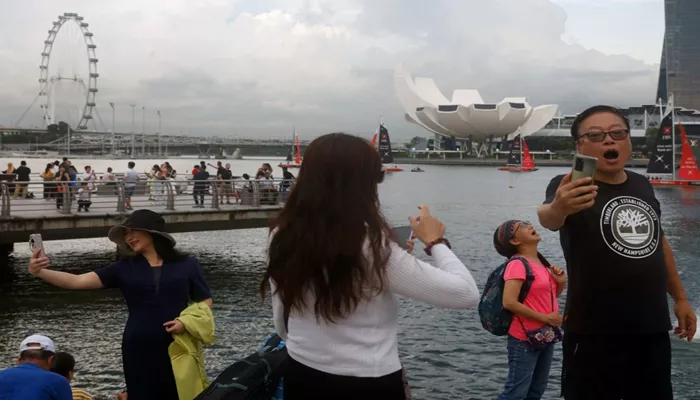Singapore has not seen an increase in arrests of Chinese visitors since the introduction of visa-free travel between the two countries, according to a government official.
Last month, three Chinese nationals, linked to foreign syndicates, were charged in Singapore for their involvement in several housebreaking incidents at private residential estates. The police are collaborating with Chinese authorities to locate an additional 14 Chinese nationals connected to these cases who have since left Singapore.
The suspects are believed to be transient travelers who entered Singapore on short-term visit passes. They typically commit crimes shortly after arriving and then leave quickly to avoid detection, local media reported.
Since February 9, citizens of Singapore and China have been allowed to visit each other’s countries visa-free for up to 30 days.
In response to a parliamentary inquiry from opposition politician Leong Mun Wai, who questioned if there had been an increase in arrests of such visitors following the visa exemption, Sun Xueling, Minister of State for Home Affairs and Social and Family Development, confirmed that there had been no rise in the number or percentage of Chinese visitors arrested since the policy change. Sun noted that even considering the 14 individuals in question, the arrest rate among Chinese visitors remains lower than the previous year’s figures.
Sun acknowledged that no visa policy could entirely eliminate the risk of crime. She emphasized that closing the borders would deter undesirable visitors but would also harm Singapore’s economy.
The tourism sector plays a significant role in Singapore’s economy. Last year, it generated S$27.2 billion (US$20.8 billion) in revenue and employed over 71,000 people. From 2014 to 2023, excluding the pandemic years, it contributed an average of 3% to Singapore’s gross domestic product.
Sun highlighted that neighboring countries such as Malaysia and Thailand have also introduced measures to attract Chinese visitors, including visa exemptions and enhanced flight services. To remain competitive, Singapore must balance maintaining its appeal with appropriate border controls.
The Immigration and Checkpoints Authority’s updated clearance procedures, which use biometric technology, have resulted in a higher percentage of travelers being denied entry. This system helps identify individuals who have committed crimes in Singapore, even if they attempt to enter under a different identity.
Sun emphasized that the mutual visa exemption with China was a well-considered decision, balancing security risks with economic benefits. She assured that the arrangement was in Singapore’s best interests.
Leong Mun Wai, from the Progress Singapore Party, expressed concerns about whether more deterrent measures are needed given the involvement of Chinese nationals in crimes such as scams and money laundering. Sun responded by noting that authorities continually review and update laws to address evolving criminal activities and the increasing use of technology in transnational crime.
In June, Singapore’s courts dealt with the last of ten money launderers linked to China’s Fujian province. This group was involved in an illicit online gambling ring with bases in Southeast Asia and used their profits to purchase high-end items, including luxury cars and properties.
Following this, Singapore introduced legislative changes to strengthen its anti-money laundering regime. These changes included increased fines for non-compliant corporate service providers and stricter rules on nominee directorships.
Last month, Singapore police reported ten cases of housebreaking between June 1 and August 4, primarily in private residential estates around the Rail Corridor and Bukit Timah Road. So far, items worth S$1.36 million out of the total S$3.85 million reported stolen have been recovered.


